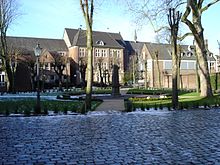Cornelis de Pauw
Cornelis de Pauw (also Cornelius de Pauw or Corneille de Pauw ; born August 18, 1739 in Amsterdam , † July 5, 1799 in Xanten ) was a Dutch historian , cultural philosopher and philologist .
Due to his services to France as an employee of the Encyclopédie ou Dictionnaire raisonné des sciences, des arts et des métiers , he was honored by Emperor Napoléon with the bestowal of honorary citizenship and posthumously with the erection of an obelisk .
Life
Cornelis de Pauw worked at the Encyclopédie Diderots and was the first foreigner to receive honorary citizenship of France . Canon of the Xanten Viktorstift since 1761 , he was ordained a subdeacon in 1765 and librarian of the monastery library . Sent to Frederick the Great on a special mission by the Stiftskapitel in 1767, the latter made him his reader, a position that de Pauw, however, gave up again in 1768. A second stay at Sanssouci Palace followed in 1775. Although Frederick the Great offered de Pauw a position in the Academy of Sciences and as a canon in Breslau, he returned to Xanten, where he stayed until his death in 1799.
De Pauw was the uncle of the Jacobin Anacharsis Cloots .
plant
In 1768 de Pauw published his work Recherches philosophiques sur les Américains, ou Mémoires intéressants pour servir à l'Histoire de l'Espèce Humaine , which was translated into German in the same year ( Philosophical studies on the Americans ). There he described the Indians as degenerate, impotent, weak, mentally limited and therefore inferior to the Europeans - and the colonization of America as unnatural and reprehensible: Due to a lower life expectancy and lower fertility, this continent called the existence of civilized mankind into question; With inflation-driving gold and the addictive substance tobacco, he only brought disadvantages, half a million Germans disappeared uselessly into the local forests.
In doing so, he started a heated debate about the "nature of Americans" among scientists. So in 1769 the royal librarian Abbé Antoine Joseph Pernety (1716-1801) responded with his dissertation on l'Amérique et les Américains contre les Recherches philosophiques de Mr. de P *** with a passionate accusation, which de Pauw three months later with his Défense des Recherches philosophiques was answered. Now another opponent intervened under the pseudonym "Le Philosophe la Douceur" (probably Zacharie de Pazzi de Bonneville ), who responded to the arguments of both contenders in ironic pamphlets. The long-standing controversy and the appearance of new additions to the tracts were accompanied by numerous other statements by scientists and lively sympathy from the press.
Although de Pauw was heavily attacked for never having been to America and not even seeing any Native American people, he won the debate. His audience preferred his summarizing, critical review of the state of the art over Pernety's lengthy “counter-evidence”. De Pauw was asked by Diderot to write an article about the Americans for the supplement to the Encyclopédie. His image of America was even adopted by famous authors such as Immanuel Kant , Guillaume Thomas François Raynal and William Robertson .
Honor
In 1811 Napoléon Bonaparte had the “Obelisk de Pauw”, with the inscription “Author of the research on the Egyptians, Chinese, Greeks, Americans” in French, built in Xanten, which at that time belonged to France, where he also received the “Cornelius -de-Pauw-Straße ”south of the city center.
Works
- Recherches philosophiques sur les Américains, ou Mémoires intéressants pour servir à l'Histoire de l'Espèce Humaine. Avec une Dissertation sur l'Amérique & les Américains. London 1771 ( full text available )
- Recherches philosophiques sur les Egyptiens et les Chinois. London, Lausanne and Geneva 1774
- Research philosophiques sur les Grecs. Paris 1788, Berlin 1787–1788, translated by Herr von Pauw: Philosophical Studies on the Greeks, Part 1 and Part 2, Heinrich August Rottmann, Berlin 1789
literature
- Gisbert Beyerhaus: Abbé de Pauw and Frederick the Great, a settlement with Voltaire. In: Historical magazine . Vol. 134 (1926), H. 3, pp. 465-493 ( digitized from JSTOR ).
- Peter Frowein: Pauw, Franz Kornelius de. In: New German Biography (NDB). Volume 20, Duncker & Humblot, Berlin 2001, ISBN 3-428-00201-6 , pp. 140 f. ( Digitized version ).
- Fritz Hofmann: Canon Cornelis de Pauw. An important Xanten personality of the 18th century . (Lectures from Xanten on the history of the Lower Rhine; 32) Gerhard-Mercator-Univ. Duisburg, Duisburg 2002.
- Cornelia Rose: The Xanten pen . Cologne 1986
Web links
swell
- ^ Susanne Zantop : Colonial fantasies in pre-colonial Germany (1770-1870) . Erich Schmidt Verlag, 1999. p. 66
- ^ Antonello Gerbi: The Dispute of the New World. The History of a Polemic, 1750-1900. University of Pittsburgh Press, Pittsburgh 1973, ISBN 0822932504 , p. 52ff
- ^ Susanne Zantop: Colonial fantasies in pre-colonial Germany (1770-1870). Erich Schmidt Verlag, 1999. P. 66ff
- ^ Sandra Carreras, Günther Maihold: Prussia and Latin America: in the area of tension between commerce, power and culture. LIT Verlag Berlin-Hamburg-Münster, 2004. p. 62
| personal data | |
|---|---|
| SURNAME | Pauw, Cornelis de |
| ALTERNATIVE NAMES | Pauw, Corneille de; Pauw, Cornelius de |
| BRIEF DESCRIPTION | Dutch historian, cultural philosopher and philologist |
| DATE OF BIRTH | August 18, 1739 |
| PLACE OF BIRTH | Amsterdam |
| DATE OF DEATH | July 5, 1799 |
| Place of death | Xanten |
